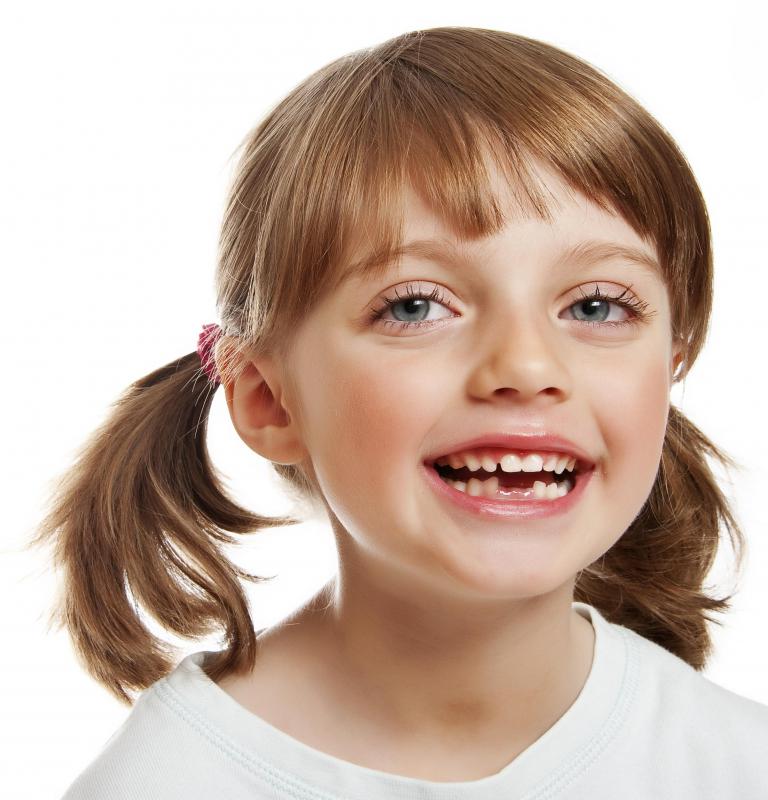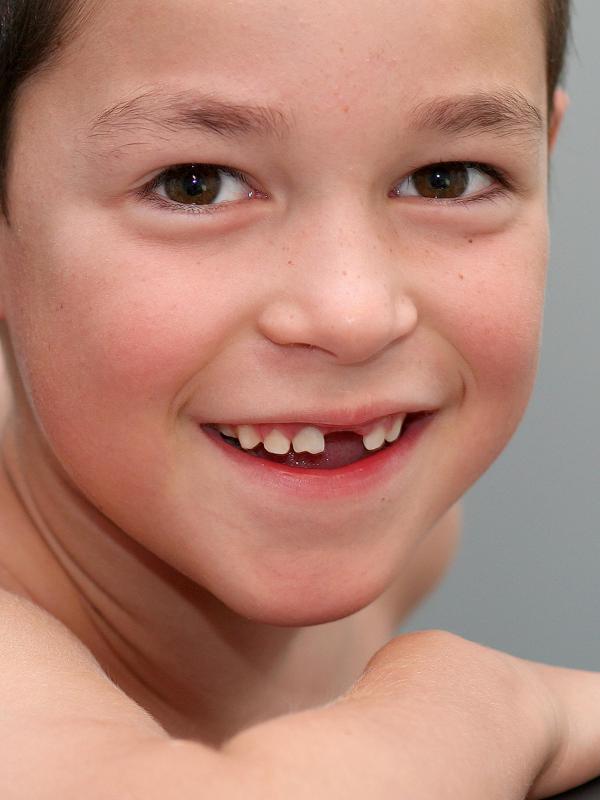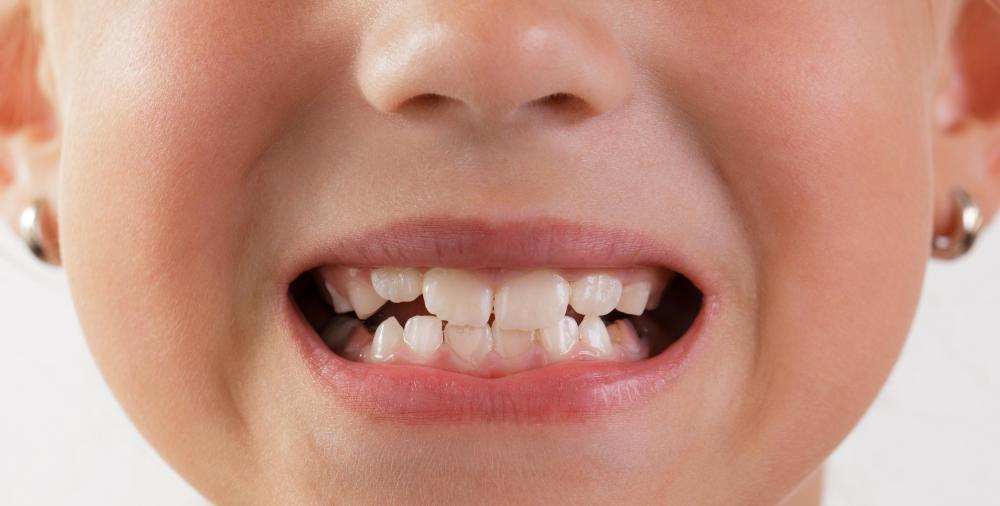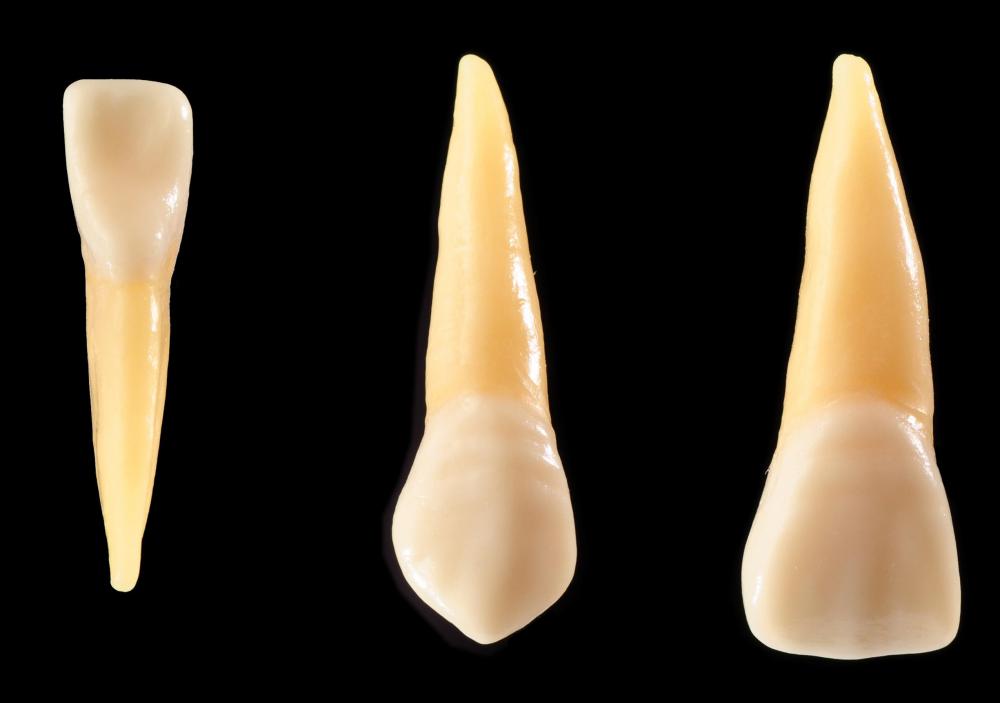At BeautyAnswered, we're committed to delivering accurate, trustworthy information. Our expert-authored content is rigorously fact-checked and sourced from credible authorities. Discover how we uphold the highest standards in providing you with reliable knowledge.
When do Children Have All of Their Adult Teeth?
There are a total of 32 permanent or adult teeth that erupt in the human mouth. With the exception of the third molars, which come through a few years after all the others, most of these will have pushed through the gums by the time a child reaches the age of 13 or so. As this transition happens, proper dental care is critical, and many children have to make adjustments to what and how they eat.
General Guideline

Typically, kids get their adult teeth in the same order they got their baby ones. They usually come in from front to back, with the exception of the first molars, and in general, the ones in the lower jaw tend to show up just slightly ahead of their counterparts in the upper jaw. The order of appearance is usually first molars and central incisors, lateral incisors, canines and premolars, second molars and third molars. It takes about six or seven years for all of them to erupt, not including the third molars.
Order of Loss

The central incisors are typically the first to come in. This typically happens around age six or seven, and in most cases, the lower ones appear first. At the same time, as the mouth expands, it makes room for the first molar teeth, which often appear between the ages of six and eight.
Following the first molars and central incisors come the lateral incisors. Kids usually lose the lower ones when they're about seven or eight, followed by the uppers a year or so later. The lower canines emerge at around nine or 10, as well, followed by the upper first premolars, also called first bicuspids, between 10 and 11. The lower first premolars and upper second premolars show up any time between 10 and 12 years of age, while the lower second premolars and upper canines appear when kids are around 11 or 12.
Next to erupt are the second molars, which generally appear when children are 11 – 13 years old. The lower set usually come through first. After this, kids get a bit of a break. They don't get their third molars until they're between 17 and 21.
Teeth Function and Eating Issues

Each type of tooth in the mouth has a specific function in terms of helping a person chew their food. The eight incisors — four on the top and four on the bottom — are the ones in front, and they cut and chop. The canines, which are next to the incisors, are meant to tear, so they are usually are pointy. Premolars grind and crush, while molars help move food around, mixing and squishing it before a person swallows.

With these roles clearly defined, it's very common for kids to have trouble with certain kinds of foods at different points. Apples and carrots, for instance, can be a problem when the incisors are loose or missing, and later on, when the premolars are emerging, chewing bites thoroughly is more of an issue. The fact that kids have a mixture of baby and permanent teeth between six to 13 years old also can create general difficulty, simply because the teeth are not all the same size or height, and because it can feel so different to chew on one side versus the other. Children sometimes have to adjust how they are eating to make things work, and they usually need to step up brushing and flossing to make sure that food particles don't get trapped in gaps.
The Dentist's Role

Most of the time, adult teeth push the baby ones, which essentially are placeholders, out of the way without any problems. Occasionally, however, the first set might develop issues, such as cavities, that if left untreated, can cause premature loss. Children also sometimes have smaller-than-normal jaws, which means there is limited space for development. It is important for children to see a dentist regularly for these reasons, as he can perform routine cleaning and take x-rays to determine if everything is forming correctly. Most professional dental organizations recommend starting care very early because of how baby teeth later can affect the permanent ones, with the general guideline being to bring in children in six months after their first baby tooth comes in, and no later than when they start school.
Considerations
Not all children develop the same way. Some begin to get their first adult teeth as early as four or five, and some are still getting them in when they're 14 to 15. Similarly, the molars are somewhat fickle — sometimes they come in, and sometimes they don't. Parents don't necessarily need to worry if their children are a little off the normal schedule, and with proper dental care, any abnormalities that do show up are usually fixable. The main things to look at as the permanent set comes in, therefore, are whether each tooth is coming in straight, and whether it is functioning well without pain.
AS FEATURED ON:
AS FEATURED ON:















Discussion Comments
@post 13: I have never heard of that in my life! I'm very curious to see what your teeth look like.
I'm 17 and have 12 baby teeth left. I only lost the ones I did as a kid because I pulled them out. If I left them alone when they were wobbly they just became stronger again and stopped wobbling. I take it this is bad, especially since I have some of my adult teeth and my wisdom teeth have started to come through.
@Azuza -- I was older when my wisdom teeth came in too. I wasn't so lucky though because they were coming in at an angle, and pushing all my other teeth forward. I don't think any age is a good one to get your wisdom teeth removed, but I think it would be easier in your 20's than later on in life.
When my daughter was in kindergarten, it was a big deal to lose a tooth. They even kept track of this in their classroom. This helped the kids be excited about it, and look forward to it instead of being scared when it happened.
You have to lose your baby teeth before you will get all of your adult teeth. When you are younger, and look forward to the tooth fairy, it can be kind of an exciting thing to lose your teeth. Even so, it always nice when all of your adult teeth have come in and you no longer have gaps in your mouth.
This article reminds me of the song, "All I Want for Christmas is my Two Front Teeth." It is so common to see young kids missing their teeth when they smile. When I look back at old school pictures of myself and my kids, many of them have that toothless grin.
@ShadowGenius -- When it comes to getting braces, we found it was best to wait until your child is done growing. When my son was around 14 years old, our dentist suggest we see an orthodontist to see about getting braces.
We decided to wait for a couple of years and by this time, his teeth were all straight and looked great. Not only did we save ourselves a bunch of money, but our son also did not have to go through that whole process for nothing.
As far as children getting all of their adult teeth, that age is going to be different for everyone. Sometimes it is best to just be patient and wait before going ahead with any kind of expensive dental work.
@betterment - Good point. I never had any cavities in my baby teeth, luckily. I didn't start having cavities til I already had all my adult teeth.
It's definitely important for kids to take good care of their baby teeth while their adult teeth are coming in. It seems like a waste of time and money to put fillings in baby teeth that are just going to eventually fall out.
However, if you let cavities go for too long, you can get an infection. So it is necessary to take care of it if your child gets a cavity in their baby teeth.
@Azuza - That's interesting! Almost everyone I know got their adult wisdom teeth (or had them taken out because they were impacted) in high school.
As the article said, there is definitely a general time line for when you get your adult teeth, but everyone is different. For example, I didn't get my back molars (I think a lot of people call them "12 year molars") until I was 14!
Also, I didn't get any wisdom teeth until I was 25! I thought I just wasn't going to have any wisdom teeth, until one day I noticed they had started growing in. Luckily, they grew in straight, so I didn't have to have anything done to them.
@BigBloom
I think that this is more of a societal problem, as is braces and the obsession with appearance. If schools are training kids to be obsessive about their appearance, maybe we should all homeschool our kids. Most dental problems tend to correct themselves, but adding the problem of gum recession by using braces is not a helpful way to deal with peer pressure problems.
@ShadowGenius
What about kids with teeth which are really askew? I think that these children suffer unnecessary taunting in school and are psychologically affected because of appearance.
I have found braces to be a bad decision in certain cases. If your teeth are truly unable to function in a normal fashion, I would consider braces, but anything short of that can be an unnecessary investment of time and money. Not only that, but children are making a lifelong commitment, since the orthodontist expects them to use their retainers for the rest of their lives. This is because the gums take forever to grow back and the teeth continue to need unnatural supports.
Post your comments